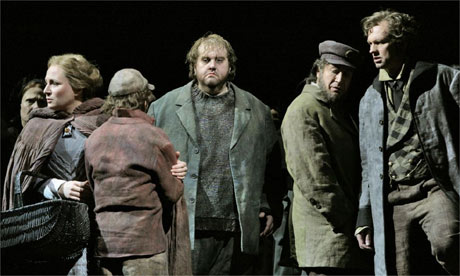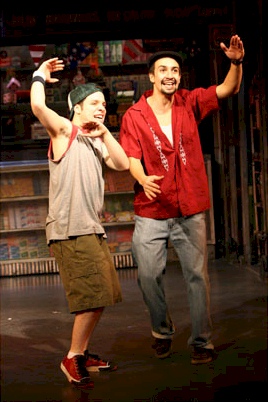A.J. Liebling, World War II Writings (Library of America, $40). An omnibus collection of wartime dispatches to The New Yorker, plus twenty-eight previously uncollected articles and Normandy Revisited, the uncommonly elegant 1958 memoir in which Liebling wove together present- and past-tense accounts of his wartime and postwar visits to the site of D-Day. The contents may sound miscellaneous, but in fact they’re magnetically readable. Except for Ernie Pyle, no American journalist did a better job of serving as a witness to war in the twentieth century, and these pieces combine lightness of touch with high seriousness to tremendously powerful effect (TT).
Archives for March 2008
TT: Perpetual motion
 I’m in Cambridge, Massachusetts, and it wasn’t easy getting there, either. Last week I saw Caryl Churchill’s Drunk Enough to Say I Love You? at the Public Theater and Mark Morris’ production of Purcell’s King Arthur at New York City Opera. On Saturday morning I took a train to Philadelphia, where I met Ms. Household Opera for lunch, then took her to the Metropolitan Opera’s high-definition closed-circuit live movie-house telecast of Benjamin Britten’s Peter Grimes, which we viewed in an amusingly pretentious theater. (I’ll be writing about the experience in my next “Sightings” column.)
I’m in Cambridge, Massachusetts, and it wasn’t easy getting there, either. Last week I saw Caryl Churchill’s Drunk Enough to Say I Love You? at the Public Theater and Mark Morris’ production of Purcell’s King Arthur at New York City Opera. On Saturday morning I took a train to Philadelphia, where I met Ms. Household Opera for lunch, then took her to the Metropolitan Opera’s high-definition closed-circuit live movie-house telecast of Benjamin Britten’s Peter Grimes, which we viewed in an amusingly pretentious theater. (I’ll be writing about the experience in my next “Sightings” column.)
 As soon as the show was over, I headed straight to the Philadelphia airport and flew from there to Boston, then drove to Cambridge, where Mrs. T awaited me. Yesterday afternoon the two of us saw the production of The Tempest that I’ll be reviewing in Friday’s Wall Street Journal, then dined at the home of the jewelry designer who made the one-of-a-kind engagement ring that is now to be found on Mrs. T’s finger. Not only is she a fabulous cook, but she has an excellent boyfriend to boot.
As soon as the show was over, I headed straight to the Philadelphia airport and flew from there to Boston, then drove to Cambridge, where Mrs. T awaited me. Yesterday afternoon the two of us saw the production of The Tempest that I’ll be reviewing in Friday’s Wall Street Journal, then dined at the home of the jewelry designer who made the one-of-a-kind engagement ring that is now to be found on Mrs. T’s finger. Not only is she a fabulous cook, but she has an excellent boyfriend to boot.
Later today we’ll be heading back to our hideout in Connecticut, where I plan to spend the week sleeping late and working on Rhythm Man: A Life of Louis Armstrong, which got short shrift while I was preoccupied with my opera workshop. On Thursday we return to New York, on Friday Our Girl in Chicago pays us a house call, and on Saturday the three of us go to Baltimore to see CenterStage’s production of Stephen Sondheim’s A Little Night Music. Whew!
All this incessant activity is likely to slow my blogging for the coming week, but I’ll do what I can, and CAAF and OGIC will do the rest.
See you in passing.
TT: Almanac
“I esteem biography, as giving us what comes near to ourselves, what we can turn to use.”
Samuel Johnson, quoted in James Boswell, Journal of a Tour to the Hebrides (courtesy of Anecdotal Evidence)
TT: A piano, a camcorder, and a competition
The Van Cliburn Foundation has just announced a new competition for amateur pianists, the Cliburn YouTube Contest, whose participants post videos of their piano playing. The winner will receive $2,000 and be automatically entered in the next face-to-face Cliburn Amateur Competition, to be held in 2011. It’s a great gimmick, one that’s bound to attract attention–but will it be good for those pianists who choose to participate? That’s the subject of my latest “Sightings” column in today’s Wall Street Journal. Here’s a sample.
* * *
Fifty years ago next month, a 23-year-old whiz kid from Texas won the Tchaikovsky International Piano Competition in Moscow, instantaneously becoming America’s best-known classical musician and earning a hatful of money in the process. Van Cliburn, then as now a generous man, thereupon started his own piano competition, hoping to give other gifted young artists the same opportunity that the Tchaikovsky Competition had given him. Mr. Cliburn hasn’t played regularly in public since 1978, but the Van Cliburn Competition is still doing business in Fort Worth, and it’s celebrating the anniversary of his Cold War triumph by launching a new venture that would have been unthinkable in 1958: the Cliburn YouTube Contest, in which amateur pianists over the age of 35 shoot videos of their own playing and upload them to the Cliburn Foundation’s YouTube channel, youtube.com/vancliburnfoundation, where computer-savvy music lovers will view them and pick a winner….
So far as I know, the Cliburn YouTube Contest is the first such event of its kind, but the Cliburn Foundation has been holding amateur competitions since 1999. Michael Kimmelman, the New York Times’ senior art critic, was one of the finalists that year, and his participation, not surprisingly, brought the competition a fair amount of press coverage. I expect that the YouTube Contest will have the same effect–as well it should. It is an idea so self-evidently ingenious that your immediate response will probably be to wonder why nobody ever thought of such a thing before.
I have less clear-cut feelings about the Amateur Competition itself, however. Seven years ago I sat on the jury for a jazz piano competition, and came away as dubious about the virtues of artistic competitions as I’d been when I started. Does it really advance the cause of art to treat musicians, painters or novelists as if they were beauty-pageant contestants? Very likely not–but such undertakings will always be with us, for there is something in the nature of head-to-head competition that audiences find inherently exciting. That’s why I agreed to serve as a judge: I thought it my duty to see how the process worked in practice. Yet I still felt equivocal about what I was doing. In a race, somebody always comes in first; in art, nobody does. Why, then, encourage amateurs to put themselves through the wringer of a high-profile competition? Might the experience diminish their passion for the artistic endeavors to which they freely devote such big chunks of their lives?
That Van Cliburn should be lending his name to the YouTube Contest is ironic, for he is one of the saddest examples of the damage that can be done to a serious artist who unexpectedly hits the celebrity jackpot….
* * *
Read the whole thing here.
CAAF: Huzzahs
Terry, OGIC, and I are all big fans of Kate Christensen’s work, so it was thrilling to hear that her most recent novel, The Great Man, has received a well-deserved honor, taking home the 2008 Pen/Faulkner Award for Fiction.
I was also pleased to learn from Galleycat that Sonya Hartnett, author of the phenomenal Thursday’s Child and other novels, has received the Astrid Lindgren Memorial Award for children’s literature. Yay yay!
TT: The slickest show in New York
In today’s Wall Street Journal I review two very different shows, In the Heights and The Seagull. Here’s a sample.
* * *
 The hit of the year is here. “In the Heights,” the Latino musical that tore up Off Broadway last season, has transferred to Broadway in a revised version that is without doubt the slickest show in town. This high-stepping tale of immigrant life in the Upper Manhattan barrio throbs with self-confidence, and its theatrical craftsmanship is gleamingly immaculate. If it’s originality you want, go elsewhere on the double, but if all you require of a musical is an evening of ultra-familiar plot devices buffed to the highest possible gloss and revved up to hypersonic speed, you’re in luck and then some….
The hit of the year is here. “In the Heights,” the Latino musical that tore up Off Broadway last season, has transferred to Broadway in a revised version that is without doubt the slickest show in town. This high-stepping tale of immigrant life in the Upper Manhattan barrio throbs with self-confidence, and its theatrical craftsmanship is gleamingly immaculate. If it’s originality you want, go elsewhere on the double, but if all you require of a musical is an evening of ultra-familiar plot devices buffed to the highest possible gloss and revved up to hypersonic speed, you’re in luck and then some….
If life were fair, Classic Stage Company’s version of Anton Chekhov’s “The Seagull” would move uptown, settle into one of Broadway’s smaller houses, and run for a year. Instead, you have a month to catch it, so don’t wait. It’s been a long time since New York has seen a classical revival comparable in quality or immediacy.
Much of the strength of this engrossing production lies in the fact that it was staged by Viacheslav Dolgachev, who spent a decade as the leading director of the Moscow Art Theatre, the company with which Chekhov’s plays are most closely identified. Yet except for Alan Cumming, who plays Trigorin, everyone in the cast is more or less American, and the play is performed in Paul Schmidt’s clean, colloquial English-language version, which Mr. Schmidt aptly describes as “an American translation, not simply another ‘English’ translation.” The blending of Russian emotionalism with American directness is what gives this “Seagull” its distinctive quality: It sounds American, yet feels Russian….
* * *
Read the whole thing here.
TT: Almanac
“I once won one of Mary Ann Madden’s ‘Competitions’ in New York magazine. The task was to name or create a ’10’ of anything, and mine was the World’s Perfect Theatrical Review. It went like this: ‘I never understood the theater until last night. Please forgive everything I’ve ever written. When you read this I’ll be dead.’ That, of course, is the only review anybody in the theater ever wants to get.”
David Mamet, “Why I Am No Longer a ‘Brain-Dead Liberal'” (Village Voice, Mar. 11, 2008)
CAAF: Morning coffee
• Julian Barnes writes about Flaubert’s late correspondence in the Times Literary Supplement. Barnes quotes a letter the author wrote near the end of his life where he said, “Giving the public details about oneself is a bourgeois temptation I have always resisted,” killing hopes that if Flaubert lived today he would be on Tumblr (URL: farouche.tumblr.com).
• I also finally got to Hilary Mantel’s essay on Chambers Dictionary of the Unexplained and think you should get to it too:
To many of us, a great deal of what we encounter daily is unexplained. If you are in mid-life now, it is possible to have received what was described at the time as a good education and still know nothing of science or technology. Those on the other side of the cultural divide complain that the artists are proud of their deficiency, but this is seldom so. It’s easy, if you can read, to brush up your Shakespeare, but not so easy to use your spare half-hours to catch up on the inorganic chemistry you missed. It’s the people cringing from their scientific illiteracy who buy Stephen Hawking books they can’t read, as if having them on the shelf will make the knowledge rub off; they snap up tracts on atheism, too, to show that if they’re ignorant they’re at least rational.
If she’d only mentioned that never-read copy of Gödel, Escher, Bach, it’d be like she was seeing into my soul.
(Both these links purloined over various months from Jenny Davidson.)
• Also, finally, against my better judgment, and with fear that I will make my dear co-bloggers grip their heads and exclaim, “What have you done to our blog! Our beautiful arts blog!” but I have to share my outrage with everyone, I am including a link to David Cook doing unspeakable things to “Eleanor Rigby” on American Idol. Just watching this performance nearly turned me into Seymour Glass, it was that phony, and people are praising it! Simon! Joe R.! I look forward to next week when David will freestyle for ten minutes, then break his guitar over the speaker while performing “The Sound of Silence.”
